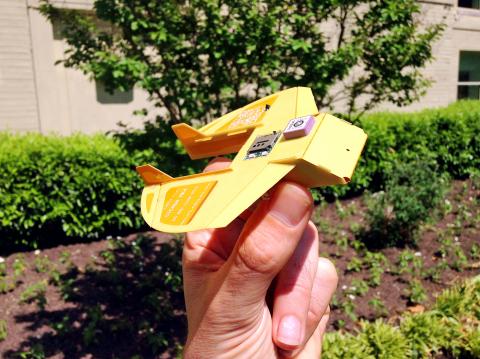US military scientists have invented a miniature drone that fits in the palm of a hand, ready to be dropped from the sky like a mobile phone with wings.
The “micro air vehicle” is named after the insect that inspired its invention, the cicada, which spends years underground before appearing in great swarms, reproducing and then dropping to the ground dead.
“The idea was: Why can’t we make UAVs [uncrewed aerial vehicles] that have the same sort of profile,” US Naval Research Laboratory flight controls engineer Aaron Kahn told reporters. “We will put so many out there, it will be impossible for the enemy to pick them all up.”

Photo: AFP
The “Cicada” — short for covert autonomous disposable aircraft — was designed to be smaller, cheaper and simpler than any other robotic aircraft, but still able to carry out a mission in a remote battlefield.
The prototype cost just US$1,000 and the cost could come down to as little as US$250 per unit, Kahn said.
With no motor and about 10 parts, the Cicada resembles a paper airplane with a circuit board.
It is designed to glide to programmed GPS coordinates after being dropped from an aircraft, a balloon or a larger drone, researchers said.
In a test about three years ago in Yuma, Arizona, Cicada drones were released from 17,500m. The drones flew — or fell — 18km, landing within 5m of their target.
The Cicada can fly at 74kph per hour and are virtually silent, with no engine or propulsion system.
“It looks like a bird flying down,” Naval Research Laboratory aerospace engineer Daniel Edwards said. “[However,] it’s very difficult to see.”
In the flight test, the Cicada had sensors that could send back readings for temperature, air pressure and humidity.
Researchers said the mini-drones could be used for a myriad of missions.
“They are robotic carrier pigeons. You tell them where to go and they will go there,” Edwards said.

NATIONAL SECURITY THREAT: An official said that Guan Guan’s comments had gone beyond the threshold of free speech, as she advocated for the destruction of the ROC China-born media influencer Guan Guan’s (關關) residency permit has been revoked for repeatedly posting pro-China content that threatens national security, the National Immigration Agency said yesterday. Guan Guan has said many controversial things in her videos posted to Douyin (抖音), including “the red flag will soon be painted all over Taiwan” and “Taiwan is an inseparable part of China,” while expressing hope for expedited “reunification.” The agency received multiple reports alleging that Guan Guan had advocated for armed reunification last year. After investigating, the agency last month issued a notice requiring her to appear and account for her actions. Guan Guan appeared as required,

Japan and the Philippines yesterday signed a defense pact that would allow the tax-free provision of ammunition, fuel, food and other necessities when their forces stage joint training to boost deterrence against China’s growing aggression in the region and to bolster their preparation for natural disasters. Japan has faced increasing political, trade and security tensions with China, which was angered by Japanese Prime Minister Sanae Takaichi’s remark that a Chinese attack on Taiwan would be a survival-threatening situation for Japan, triggering a military response. Japan and the Philippines have also had separate territorial conflicts with Beijing in the East and South China

A strong cold air mass is expected to arrive tonight, bringing a change in weather and a drop in temperature, the Central Weather Administration (CWA) said. The coldest time would be early on Thursday morning, with temperatures in some areas dipping as low as 8°C, it said. Daytime highs yesterday were 22°C to 24°C in northern and eastern Taiwan, and about 25°C to 28°C in the central and southern regions, it said. However, nighttime lows would dip to about 15°C to 16°C in central and northern Taiwan as well as the northeast, and 17°C to 19°C elsewhere, it said. Tropical Storm Nokaen, currently

PAPERS, PLEASE: The gang exploited the high value of the passports, selling them at inflated prices to Chinese buyers, who would treat them as ‘invisibility cloaks’ The Yilan District Court has handed four members of a syndicate prison terms ranging from one year and two months to two years and two months for their involvement in a scheme to purchase Taiwanese passports and resell them abroad at a massive markup. A Chinese human smuggling syndicate purchased Taiwanese passports through local criminal networks, exploiting the passports’ visa-free travel privileges to turn a profit of more than 20 times the original price, the court said. Such criminal organizations enable people to impersonate Taiwanese when entering and exiting Taiwan and other countries, undermining social order and the credibility of the nation’s